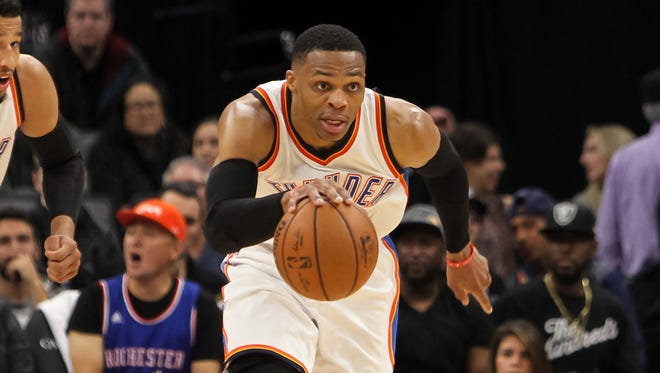Scouts' guide: How to stop, er, slow Russell Westbrook
Oklahoma City Thunder guard Russell Westbrook is playing a mesmerizing game of Stop Me If You Can.

He is a force of nature, collecting points, rebounds and assists in a furious flurry. Westbrook is averaging a triple-double (31 points, 11.3 assists, 10.8 rebounds), has 10 triple-doubles this season, including a streak of five consecutive, and is trying to become the first player since Oscar Robertson in 1961-62 to average a triple-double in a season.
Westbrook is also the reason opposing coaches don’t sleep enough.
So, how do you stop Westbrook? “Hope he has an off night,” one NBA team scout told USA TODAY Sports under the condition of anonymity because he is not authorized to speak publicly about opponents.
Week 5 NBA power rankings: Spurs quietly creeping up
More realistic, teams are trying to devise game plans that limit Westbrook. USA TODAY Sports talked to several NBA scouts and player personnel staffers about their plans.
Those front-office staffers scout future opponents and write a report detailing the strengths and weaknesses of that team and its players. It’s a crucial job. Those reports end up with head coach and assistant coaches who put together a game plan.
Here’s the emerging book on Westbrook:
Make him shoot jump shots. Get back in transition. Clog the paint. Keep the ball out of his hands as much as possible. Keep him off the free throw line. Allow him to make mistakes.
Westbrook probably chuckles at those scouting reports.

The reports also say:
A relentless attacker. A capable mid-range, pull-up jump shooter. As competitive as anyone in the league. Lethal on the fast break. A disruptive, gambling defender. A hard worker. Dominant rebounder. A willing passer for a high-volume shooter who takes a league-leading 24.2 shots per game. Decent enough on three-pointers to make teams defend him at that line. An incredible play-maker.
Stopping him takes a complete team effort, and even that’s not enough in some games.
Making him shoot jump shots is a start, but it comes with complications. He’s shooting 37.4% on jump shots between eight and 24 feet, but on pull-up jump shots, he’s shooting 43.4%, according to nba.com/stats. Defenses can’t let him take those mid-range shots, but he can also drive by defenders with his speed and strength for shots at the rim. He’s a proven finisher, shooting 57% within five feet.
Keeping the ball out of Westbrook’s hands is near impossible. He averages 8.5 defensive rebounds and is the only guard in the top 10 in that category. Opponents also can’t crash the offensive glass because if Westbrook grabs the rebound and sees an advantage, he’s going to exploit the defense in transition. To prove that, he leads the league in uncontested defensive rebounds per game (7.7).
Draymond Green's agent blasts NBA stance on 'unnatural acts'
Even though he’s a fantastic finisher near the basket, clogging the paint with defenders is a reasonable plan. Making him shoot jumpers or pass the ball is a better alternative than allowing him to shoot in the restricted area. If other players make shots, opponents will live with that.
However, forcing him to pass is no guarantee for defensive success. He’s averaging double digits in assists (No. 2 in the league), and for as many shots as he takes, he still passes the ball 61.4 times per game, which is more than John Wall, Mike Conley and LeBron James.
Westbrook is all over the court, too, covering 2.46 miles per game.
Coercing him into a bad game is possible. In a victory against the Thunder, the Toronto Raptors held Westbrook to 9-for-26 shooting, didn’t allow a triple-double and Westbrook committed eight turnovers.
But a bad game isn’t a fool-proof plan either.
Atlanta Hawks looking to snap out of two-week funk
Against the Washington Wizards recently, Westbrook missed 23 of 35 shots. While he was on the court, the Thunder gave up more points than they scored per 100 possessions. But he still had 35 points (couldn’t keep him off the line), 14 rebounds and 11 assists, and the Thunder won 126-115 against Wizards coach and Westbrook’s former Thunder coach Scott Brooks.
At Westbrook’s pre-draft workout for the Thunder in 2008, Brooks remembered thinking, “Thank goodness I’m not an NBA point guard anymore because there’s no way I can stay in front of this guy.”
Even when Westbrook in his first season averaged 15.3 points, 5.3 assists and 4.9 rebounds — 15-5-5 is difficult for any player let alone a rookie — Brooks never considered what is happening now.
“Nobody thought that there would be another Oscar Robertson-type numbers in this league,” he said.
Follow Jeff Zillgitt on Twitter @JeffZillgiit.